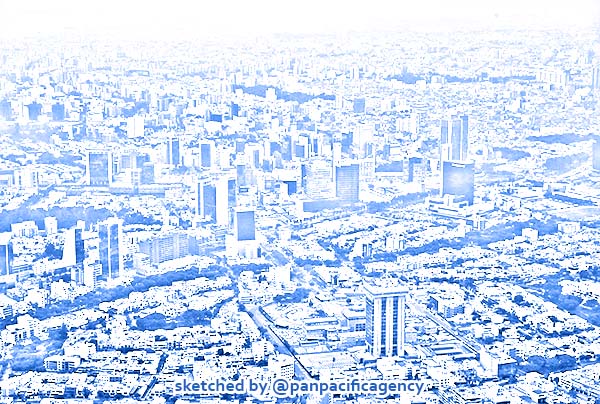Ban on private vehicles starts in Peru

Lima, capital of Peru. Photo: ANDINA. Sketched by the Pan Pacific Agency.
LIMA, Sep 21, 2020, ANDINA. The lifting of mandatory social immobilization (curfew) on Sundays —in regions and provinces that are not under targeted quarantine— starts today, September 20, but with some restrictions such as the ban on the use of private vehicles, ANDINA reported.
This was stipulated on September 17 by Supreme Decree No. 151-2020-PCM, published in El Peruano official gazette.
The aforementioned regulation modifies Supreme Decree No. 116-2020-PCM, which sets the measures to be followed by citizens as part of the new social coexistence and extends the State of National Emergency due to the severe circumstances affecting the lives of Peruvians as a result of the COVID-19 pandemic.
Moreover, the decree provides that social gatherings —including those held at home— and family visits are prohibited due to health reasons and to avoid the increase of COVID-19 infections.
According to Peruvian National Center for Epidemiology, Prevention and Disease Control (CDC) Director Luis Rodriguez, the ban on the use of private means of transportation on the seventh day of the week seeks to avoid the multiplication of family and friend gatherings, as well as trips to recreation centers where concentrations of people occur and could lead to increasing COVID-19 contagion risks.
Curfew
Starting September 21, the nighttime compulsory social immobilization is provided from 11:00 p.m. to 04:00 a.m. the next day, Mondays thru Saturdays.
In the regions and provinces under targeted quarantine, this curfew is in force from 8:00 p.m. to 04:00 a.m. the next day, Mondays thru Saturdays.
Also, on Sundays, mandatory social immobilization will be in force all day long until 4:00 am on Monday in the targeted places.
In the case of Trujillo Province in La Libertad region, mandatory social immobilization remains in force on Sundays all day long until 4:00 am on Monday.
During the curfews, strictly necessary personnel —who participate in the provision of food supply, health, medicine, financial and home food delivery services, as well as those who ensure the continued delivery of water, sanitation, electricity, gas, fuel, telecommunications services and related activities— will be exempted from social immobilization.
The staff in charge of cleaning and solid waste collection; funeral services; cargo-merchandise transportation; economic resumption-related activities; and valuables transportation —as stipulated by the ministry of Transport and Communications (MTC)— are also shielded from the order.
During mandatory social immobilization, pharmacies and drugstores are allowed to operate according to the provision thereon.
Written, radio, and television press members are allowed to be outside during the period of mandatory social immobilization provided that they carry their special transit permits, respective badges, and ID cards for identification purposes. The authorization includes mobile units that transport them.
In addition, the people who require urgent or emergency medical attention —because their health is at serious risk— are allowed to circulate as well.